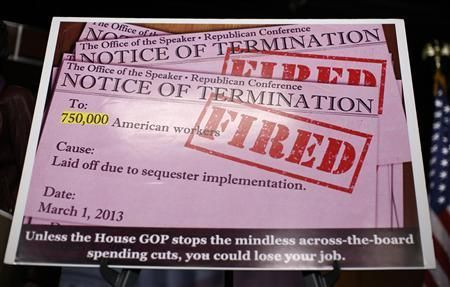Sequester Cuts 2013: What's Happened So Far

Hear that? That was the sound of the world not immediately crashing down around our heads as U.S. budget sequestration began its slow-motion squeeze.
Since Friday at midnight, Americans have officially been living in Sequesterville. What’s changed, mere hours into this new America that U.S. President Barack Obama and the Congress have blamed each other for concocting?
Precious little, it would appear at the moment. However, spending cuts will start taking effect Saturday, so more than 750,000 people nationwide could eventually see their jobs disappear, while areas such as education, food safety, and health research could experience the impact.
On the West Coast, the sequestration quake is already causing some small tremors: KTLA-TV reported that the Federal Aviation Administration is threatening to close control towers at 23 airports in California, 11 of them in the Los Angeles area. The FAA's action would be caused by the furlough of air traffic controllers.
The move to Sequesterville also means cuts in defense spending: The White House Office of Management and Budget has estimated there would be a 13 percent reduction in spending for defense programs.
In the short term, though, life may go on pretty normally. The advent of sequestration implies that the various affected government agencies have to begin sending furlough notices of temporary unpaid leave to employees, while mostly deciding for themselves how to best implement the mandated budget cuts.
Both the Justice Department and the National Labor Relations Board issued early-bird furlough notices, the Washington Post reported. The affected employees will be furloughed 14 workdays between April 21 and the end of the fiscal year in September.
“The cuts will not immediately affect most of the country,” Eric Patashnik, a professor of public policy and politics at the University of Virginia, said this week. “Because the effects are not going to be highly visible to most citizens, many of the members of Congress will not feel immense pressure to solve the problem, but it will have a significant impact on some states and jurisdictions, including Virginia.”
Come April, however, the squeeze might be felt a bit more across-the-board as the furloughs begin to roll out in earnest.
Also feeling the budget squeeze will be several major medical-research and science institutes, including the Centers for Disease Control and Prevention and NASA. “No matter how sequestration is implemented, it will ... mean that fewer physicians and scientists will be working to find better treatments and cures for diseases like cancer, Alzheimer’s, and diabetes,” Democrats in the House of Representatives said in a Feb. 13 report.
Some government employees have reported seeing pay cuts already, but most agencies will not feel the tightening until later in the year. Also unaffected, for now, are Washington’s janitors and security guards, despite Obama’s statement Friday that “[s]tarting tomorrow, everybody here, all the folks who are cleaning the floors at the Capitol -- now that Congress has left, somebody is going to be vacuuming and cleaning those floors and throwing out the garbage -- they're going to have less pay.”
Unsurprisingly, government officials in the top tier, including the president and members of Congress, will not be taking pay cuts.
Programs exempt from the rollbacks in federal spending include food stamps, Medicaid, Medicare, and Social Security, as is the Department of Veterans Affairs. However, the Centers for Medicare and Medicaid Services did say that physicians treating Medicare patients will see a sequestration-related 2 percent pay cut as of April 1, Medscape Medical News reported.
Meanwhile, some were surprised on Friday by the U.S. equity market generally closing higher before the sequestration became a done deal. For example, the Dow Jones Industrial Average (INDEXDJX:.DJI) finished 35.17 points, or 0.25 percent, in the green to finish at 14,089,66.
So, while the U.S. government continues to engage in what BuzzFeed dubbed hyperbolically “The Biggest Slap Fight Washington Has Ever Seen,” the rest of us can just go back to our weekend naps. For now.
© Copyright IBTimes 2024. All rights reserved.





















